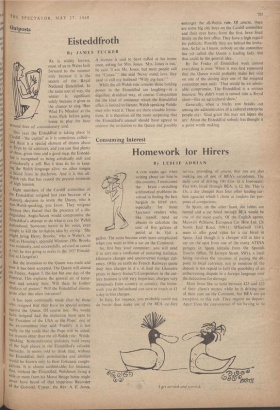} posts
Eisteddfroth
TUCKER By JAMES As is widely known, most of us in Wales look forward to the summer only because it is the season of the Royal National Eisteddfod. In the same sort of way, the winter is significant solely because it gives us the chance to sing 'Hen Wlad Fy Nhadau' at the Arms Park before going home to play the harp
a
'ound tires of concessionary coal.
This year the Eisteddfod is taking place in Cardilf--`the capital' as it is sometimes called— and there is a special clement of drama about it Even by its admirers, and you can find plenty 0., these, given time and a good map, the Eistedd- fod is recognised as being artistically null and procedurally a yell. But it does its bit in keep- ing the Welsh language alive; no other tongue is heard from its platforms. And it is this all- Vid rei.sh rule that has caused the present moments of high tension.
Eight members of the Cardiff committee of the Eisteddfod resigned last year because of a majority decision to invite the Queen, who is non-Welsh-speaking, you know. They resigned because they. feared that the presence of a dis- tinguished Anglo-Saxon would compromise the Eisteddfod's attempt to do what it can for Welsh nationhood. Someone, terror in his voice, even .sought to kill the invitation idea by crying: 'She Wright. bring Henry Brooke,' who is Wales's. as well as Housing's, splendid Minister. (Mr. Brooke stridently, and successfully, advised to cancel visit he was going to make to the 1957 Eistedd- fod at Llangefni.) . .
It has been continually made clear by those who resigned that they have no special animus against the Queen. Of course not. 'We would have resigned had the inyitation been sent to the President of the USA or the Pope,' One of the ex-committee men said. Frankly, it is not really on the cards that the Pope will be asked, reasons other than the all-WelSh rule : Welsh- speaking. Nonconformist ministers hold many of the high places in the Eisteddfod's valuable hierarchy. It seems odd to think that, without the Eisteddfod, their personalities and abilities would be known only to their fortunate congre- gations. It is almost unthinkable, for instance, that, without the Eisteddfod. Welshmen living a mule or more from his Menai Bridge home might never have heard of that imperious Recorder of the Gorsedd,. 'Cynan,' the Rev. A. E. Jones. A Woman' is said to have called at his house once, asking for Mrs. Jones. 'Mrs. Jones is out,' he said. '1 am Mr. Jones, but most people call me "Cynan." ' She said 'Never mind, love, they used to call my husband "Willy pig-face."' While the all-Welsh rule remains those holding power in the Eisteddfod are laughing—in a dignified, druidical way, of course. Competition for the kind of eminence which the Eisteddfdd offers is limited to literate, Welsh-speaking Welsh- men who want it. These are three sizeable limita- tions. It is therefore all the more surprising that the Eisteddfod's council should have agreed to endorse the invitation to the Queen and possibly endanger the all-Welsh rule. Of ,course, there are some big city boys on the Cardiff committee and their eyes have, from the first, been fixed firmly on the box office. They have a high regard for publicity. Possibly they are behind the invita- tion. As far as I know, nobody on the committee has yet called the Queen a leading lady, but that could be the general idea.
By the Friday of Eisteddfod week almost everything is over. When it was first rumoured that the Queen would probably make her visit on one of the closing days one of the resigned committee men said: 'That would 'be an admir- able compromise. The Eisteddfod is a serious business. We didn't want it turned into a Royal show—like an agricultural show.'
Generally, when a bitchy row breaks out among the administrators of a cultural.enterprise people cry: 'God grant this may not injure the art.' About the Eisteddfod nobody has thought it a point worth making.






































 Previous page
Previous page